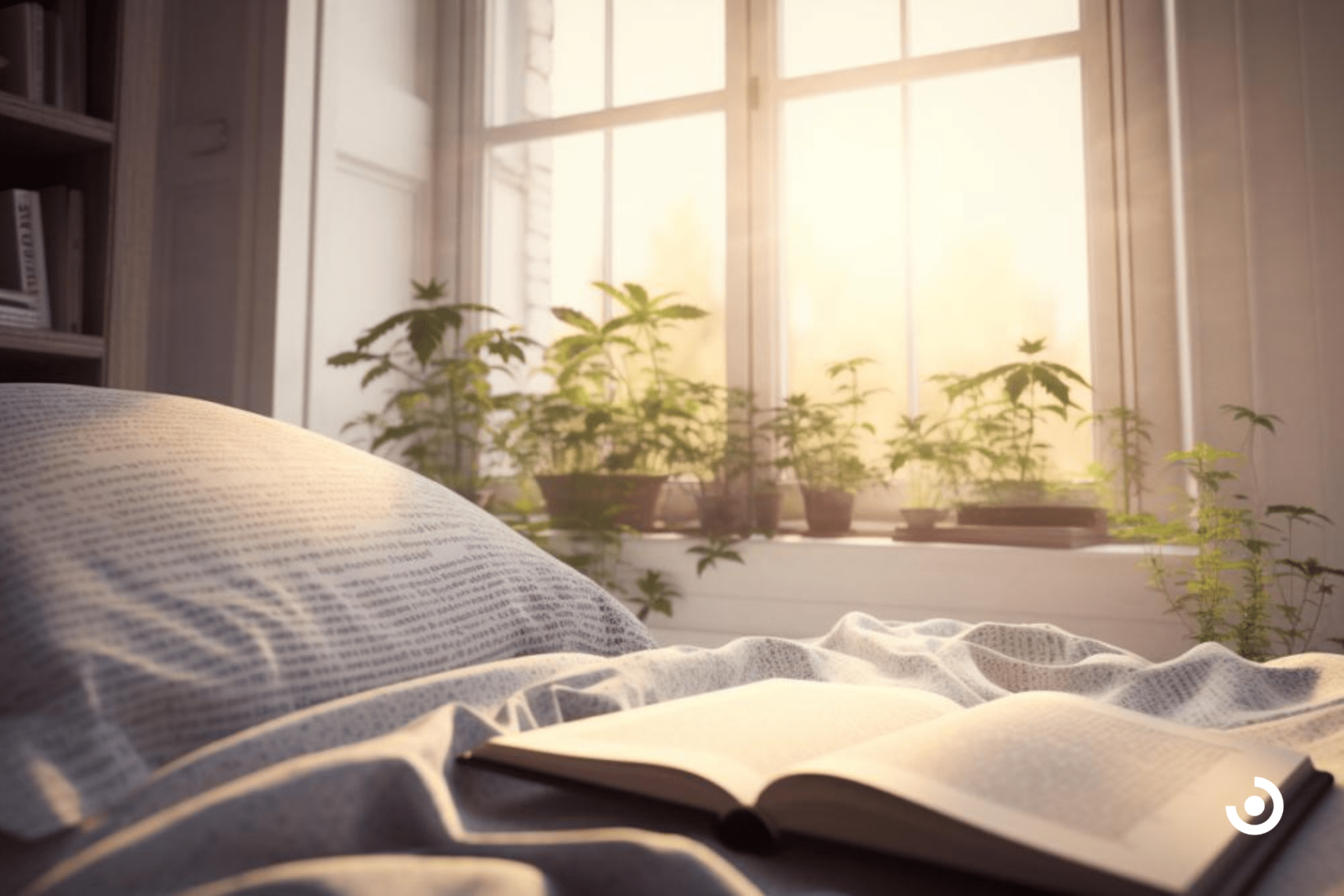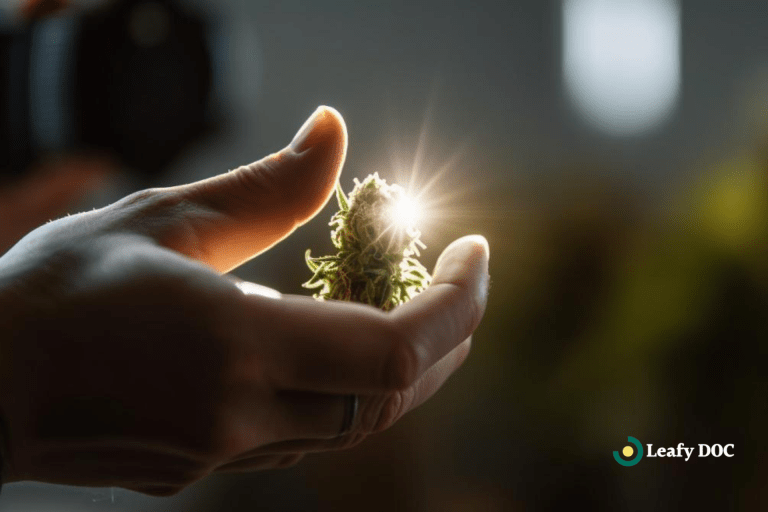Exploring Cannabis Sleep Studies: What Research Reveals
by Ayesha Aziz · March 11, 2024
Unveiling the Truth About Cannabis Sleep Studies: Findings, Secrets, and a Restful Night’s Sleep. Click to uncover the latest research and improve your sleep today!

Are you tired of tossing and turning night after night, desperately searching for a way to get a good night’s sleep? If so, you’re not alone. Sleep disorders affect millions of people worldwide, leaving them feeling exhausted and unrefreshed each morning.
But what if there was a natural solution that could help you achieve the restful sleep you’ve been longing for? That’s where cannabis sleep studies come in. In this article, we’ll explore what the latest research reveals about the impact of cannabis on sleep quality and how it can potentially be used as a treatment for common sleep disorders.
So grab a cozy blanket, sit back, and get ready to discover the fascinating world of cannabis sleep studies and what they could mean for you.
Key Takeaways
- Cannabis can have both positive and negative effects on sleep, depending on factors such as strain, dosage, and individual differences.
- Positive effects of cannabis on sleep include faster sleep onset, deeper sleep, and reduction in nightmares.
- Frequent or heavy cannabis use can disrupt sleep patterns and decrease sleep quality.
- Cannabis shows potential in treating various sleep disorders such as insomnia, sleep apnea, restless leg syndrome, and nightmares/PTSD-related sleep disturbances.
The Impact of Cannabis on Sleep Quality
So, you’re probably wondering how cannabis affects the quality of your sleep, right? Well, let’s dive into the fascinating world of cannabis sleep studies and find out.
Research has shown that cannabis can have both positive and negative effects on sleep, depending on various factors such as the strain, dosage, and individual differences.
On one hand, cannabis has been found to help with falling asleep faster and experiencing deeper sleep. This is because cannabis contains compounds called cannabinoids, such as THC and CBD, which interact with the body’s endocannabinoid system. These compounds can promote relaxation and reduce anxiety, making it easier for you to drift off into dreamland.
Additionally, cannabis has been shown to suppress the REM stage of sleep, which is when we usually dream. By doing so, it may reduce the frequency and intensity of nightmares, providing relief for those suffering from conditions like post-traumatic stress disorder (PTSD).
However, it’s important to note that cannabis can also have negative effects on sleep quality. Some research suggests that frequent or heavy cannabis use can lead to disrupted sleep patterns, decreased REM sleep, and overall poorer sleep quality. This may be due to the potential tolerance and dependence that can develop with long-term cannabis use.
Additionally, cannabis can affect the production of melatonin, a hormone that regulates sleep-wake cycles. Disruptions in melatonin production can result in difficulty falling asleep and staying asleep throughout the night.
Ultimately, the impact of cannabis on sleep quality varies from person to person. It’s essential to consider individual factors and consult with a healthcare professional before incorporating cannabis into your sleep routine.
So, if you’re looking to explore the potential benefits of cannabis for your sleep, it’s important to approach it with caution and be mindful of how it affects your overall sleep quality.
Common Sleep Disorders and Cannabis as a Treatment
Common sleep disorders can be effectively treated with cannabis. If you or someone you know is struggling with sleep issues, you may find relief in the use of cannabis.
Here are four common sleep disorders that cannabis has shown potential in treating:
- Insomnia: Cannabis has been found to help promote sleep by reducing the time it takes to fall asleep and increasing the total sleep time. It can also improve sleep quality by reducing the number of awakenings during the night. If you have trouble falling asleep or staying asleep, cannabis may be a helpful option to consider.
- Sleep Apnea: Sleep apnea is a condition characterized by pauses in breathing during sleep. It can lead to daytime sleepiness and reduced quality of life. Research suggests that cannabis may help improve sleep apnea by reducing the frequency of apneas and improving oxygen saturation levels during sleep.
- Restless Leg Syndrome (RLS): RLS is a neurological disorder that causes an irresistible urge to move the legs, especially during periods of rest. This can result in difficulty falling asleep and disrupted sleep throughout the night. Cannabis has been shown to have muscle relaxant properties, which may help alleviate the symptoms of RLS and improve sleep quality.
- Nightmares and PTSD-related sleep disturbances: Cannabis has been found to potentially reduce the occurrence of nightmares and improve sleep quality in individuals with post-traumatic stress disorder (PTSD). By reducing the frequency and intensity of nightmares, cannabis can help individuals with PTSD get a more restful night’s sleep.
While cannabis shows promise as a treatment for common sleep disorders, it’s important to consult with a healthcare professional before incorporating it into your sleep routine. They can guide dosage, strain selection, and potential interactions with other medications. Remember to prioritize your well-being and seek professional advice when considering any new treatment options.
The Role of Cannabinoids in Sleep Regulation
To better understand how cannabinoids regulate sleep, let’s delve into the existing research. Cannabinoids are chemical compounds found in cannabis that interact with the body’s endocannabinoid system, which plays a crucial role in regulating various physiological processes, including sleep.
Studies have shown that cannabinoids, such as THC and CBD, can have both sedative and alerting effects, depending on the dosage and individual response.
Research suggests that cannabinoids can help improve sleep by reducing sleep latency (the time it takes to fall asleep), increasing total sleep time, and enhancing sleep quality. THC, the psychoactive component of cannabis, has been found to have sedative properties and can help individuals fall asleep faster. On the other hand, CBD, a non-psychoactive cannabinoid, has been shown to have alerting effects and may promote wakefulness during the day, which can indirectly improve sleep at night.
It’s important to note that the effects of cannabinoids on sleep can vary from person to person. Factors such as individual physiology, dosage, and method of consumption can all influence how cannabinoids affect sleep.
Additionally, long-term use of cannabis may lead to tolerance and potential dependence, so it’s crucial to use these substances responsibly and under the guidance of a healthcare professional.
Overall, while research on the role of cannabinoids in sleep regulation is still in its early stages, existing studies suggest that cannabinoids can have a significant impact on sleep. Understanding how different cannabinoids interact with the body’s endocannabinoid system can help develop targeted treatments for sleep disorders and provide relief for individuals struggling with sleep disturbances.
Potential Side Effects of Cannabis Use for Sleep
It’s no exaggeration to say that the potential side effects of cannabis use for sleep can be quite significant. While cannabis has been shown to have potential benefits for sleep, it’s important to be aware of the potential downsides as well.
Here are some potential side effects to consider:
- Increased daytime sleepiness: While cannabis may help you fall asleep faster, it can also lead to increased daytime sleepiness. This can make it difficult to stay alert and focused during the day, which can impact your productivity and overall well-being.
- Impaired memory and cognitive function: Cannabis use has been linked to impairments in memory and cognitive function, especially when used over a long time. This can affect your ability to learn and retain information, which can hurt your daily life.
On the other hand, it’s important to note that these side effects may not apply to everyone and can vary depending on factors such as dosage, frequency of use, and individual differences. It’s always a good idea to consult with a healthcare professional before using cannabis for sleep to ensure it’s the right choice for you.
Read and Discover The Best Cannabis Strains For Managing Chronic Pain.
Future Directions in Cannabis Sleep Research
Looking ahead, you can expect future cannabis sleep research to focus on novel treatment approaches and the development of targeted therapies. Researchers are constantly striving to find new ways to improve sleep quality and address the underlying causes of sleep disorders.
One area of interest is the use of specific cannabis compounds, such as CBD (cannabidiol), to target sleep-related issues. CBD has shown promise in preliminary studies for its ability to promote relaxation and reduce anxiety, both of which can contribute to better sleep.
In addition to exploring different cannabis compounds, future research may also investigate the potential benefits of combining cannabis with other therapeutic approaches. For example, researchers may explore the use of cannabis in conjunction with cognitive behavioral therapy (CBT) or other behavioral interventions to enhance the effectiveness of these treatments. By combining different approaches, researchers hope to provide individuals with more comprehensive and personalized solutions for their sleep problems.
As research in this field progresses, it is important to remember that the ultimate goal is to improve the lives of individuals who struggle with sleep disorders. The findings from future cannabis sleep studies have the potential to not only provide more effective treatment options but also to shed light on the underlying mechanisms of sleep and how they can be regulated.
By continuing to explore the therapeutic potential of cannabis for sleep, researchers are working towards a future where individuals can enjoy restful nights and wake up feeling refreshed and rejuvenated.
Frequently Asked Questions
How does cannabis use affect dreams and the dream cycle during sleep?
Using cannabis before bed can send your dreams on a wild and vivid adventure, like a rollercoaster for your mind. But be careful, as it may disrupt your dream cycle and leave you feeling groggy in the morning.
Can cannabis use lead to dependency or addiction when used as a sleep aid?
Using cannabis as a sleep aid can lead to dependency or addiction. While it may initially help with sleep, relying on it can create a cycle of needing it to fall asleep, which can be problematic.
Are there any specific strains or types of cannabis that are more effective for improving sleep quality?
Looking to improve your sleep quality? Wondering if there are specific cannabis strains that can help? Well, let me ask you this: Have you tried exploring indica strains known for their relaxing effects?
Does cannabis use have any long-term effects on overall sleep patterns or sleep architecture?
Cannabis use can have long-term effects on sleep patterns and architecture. It may disrupt REM sleep and decrease the time spent in deep sleep stages. Regular use can also lead to tolerance and dependence, affecting overall sleep quality.
How does the method of cannabis consumption (smoking, edibles, etc.) affect its effectiveness as a sleep aid?
To truly uncover how different methods of cannabis consumption affect its sleep-aid effectiveness, let’s dive in. Imagine the smoking experience as a lullaby, the edibles as a cozy bedtime story. Which method will rock you to sleep? Let’s find out!
Last Updated: September 23, 2025
Get Approved for Your Medical Marijuana Card in Minutes!

Get Your Medical Card
Connect with a licensed physician online in minutes

Like This Article?
Share with your friends
Table of Contents
Keep Reading
-
5 Steps to Obtain Your California MMJ Card Easily
Discover how to easily obtain your California MMJ card in five straightforward steps.
-
Can you Overdose on CBD?
CBD is a popular natural remedy used for many common ailments. But can you overdose on CBD? Find out the risks and side effects of taking too much CBD.
-
Understanding Cannabis Dosing Guidelines: Finding The Right Amount
Uncover the secrets to perfect cannabis dosing with our comprehensive guide on understanding cannabis dosing guidelines. Find your ideal dose and enhance your experience today!



